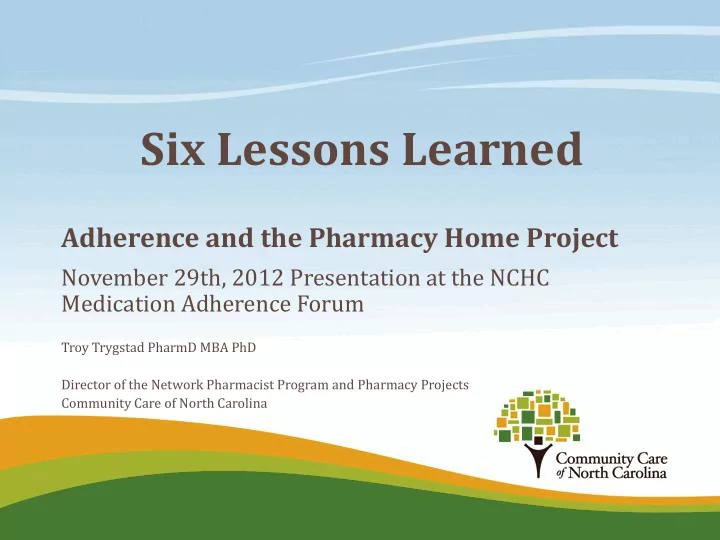

Six Lessons Learned Adherence and the Pharmacy Home Project November 29th, 2012 Presentation at the NCHC Medication Adherence Forum Troy Trygstad PharmD MBA PhD Director of the Network Pharmacist Program and Pharmacy Projects Community Care of North Carolina
Community Care Networks 2
What we’ve always known…. • …..it’s the drugs, stupid! …
…the patients we are trying to fix….
…the system we are trying to fix…. Pharmacy Hospital HH/Rehab/SNF Clinic Comprehensive Fully Informed X X X MTM MTM Med Rec Prescribing Inadequate , Misaligned or Non-Existent Payment Systems for Pharmaceutical Care *Also Incredibly C0st- inefficient in Today’s HIT/HIE Environment*
The Pharmacy Home Project The Pharmacy Home Project Premise of the Initiative “Create a Pharmacy Home, virtual or otherwise, where drug use information from multiple sources* is gathered to better inform prescribing and intervention strategies”
Descriptive Findings….
Adherence Lesson #1 1) Each patient's experience with their medication(s)is unique, no matter how complex or simple the regimen, length of time, or conditions treated. This experience has to be well understood to make progress with Adherence. It isn't the nurse, pharmacist or physician taking the medication, but rather the patient. A patient-centric, individualized approach that is well informed will work. The challenge of course is doing that effectively and efficiently with limited resources.
Adherence Lesson #2 2) Adherence counseling without clinical review is non- sensical. If I told my father to take everything in his medicine cabinet as prescribed, he would be dead by nightfall. This is the case with the majority of our sickest patients. What good is adhering to a drug use plan that doesn't work? Many patients need regimen optimization to address polypharmacy, under-treatment, interactions, and a host of other potential problems and therapeutic misunderstandings. **Quite often there is a perfectly rational (even if incorrect) reason as to why the patient has chosen to engage in “non - adherence”.**
Adherence Lesson #3 3) Adherence is a longitudinal activity. A point in time intervention is practically useless for chronic medications. Continuous and ongoing re- enforcement is often necessary to ensure persistence to therapy.
Adherence Lesson #4 4) The Health Care System Must be Incentivized to Care About Adherence and Related Outcomes to see real change. Only very recently with Health Reform have we seen the beginnings of payment for medication management and performance ratings around adherence measures. Heretofore, there was no reason for the system to providers to care about medication non-adherence.
Adherence Lesson #5 5) There is still an incredible level of unawareness on the part of physicians and other providers as to the level and severity and ill-effects of patient non-adherence to medications. We work hard to re-enforce the importance of adherence at CCNC, but there are a lot of prescribers out there not linked to a network like CCNC that are oblivious as to what actually goes on (or doesn't go on) after their patients leave the clinic.
Adherence Lesson #6 6) We need to promote a model of drug benefits management that doesn't rely on, or re-enforce patient attrition from therapy as good business practice. Traditional utilization management can cause patient disruption and potentiate non- persistence or primary non-adherence. While we shouldn’t go so far as to say that drug costs shouldn't be managed, the system needs to evolve mechanisms by which all administrative/drug benefit management issues are dealt with prior to the patient showing up at the pharmacy.
It’s ok to increase appropriate drug use……
..and here is the reason… ...the Medical Offset can be quite large
Recommend
More recommend